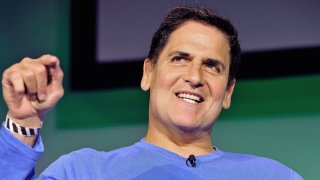
Achieving the American Dream might not always be easy, but "you can be anywhere in the country and start a company and make it to the carpet in front of us and potentially get a deal," "Shark Tank" star Mark Cuban said on a recent episode of Barbara Corcoran's podcast "888-Barbara."
"That's why I do the show and that kind of drives what I invest in."
On Friday's episode of ABC's "Shark Tank," entrepreneur Krystal Persaud, founder of solar chargers company Grouphug, won Cuban over with her story and work ethic.
Persaud is a first-generation American – her parents emigrated to the U.S. from Guyana with just $100.
Get Philly local news, weather forecasts, sports and entertainment stories to your inbox. Sign up for NBC Philadelphia newsletters.
Persaud's three older sisters all work in the medical field, and as a designer, she wanted to prove to her parents that she could make a living, she told the Sharks.
"I have seven years of experience making consumer electronics. I started off as an intern at a tech company in New York," she said during the episode. "I was the industrial design intern, and by the time I left, I was senior director of product design. I'm not an engineer, but I'd like to say I'm a 'creative technologist.'"
Despite her success designing toys, she decided to instead pursue a career in sustainability and ultimately be her own boss.
Money Report
"I didn't want to work for someone else. I knew that I could come up with something that is worth a lot," Persaud said.
Persaud did that by founding Grouphug, where she designs and sells small window solar panels.
"I quit my toy job to focus on sustainability. I wanted to be part of the solution," she wrote in a blog post. "I design solar panels as if they are toys. I wanted a solar panel I could use every day that was beautiful enough to hang in my apartment."
Each window solar panel connects to chargers for electronic devices.
"While the sun hits your solar panel during the day, all of that energy gets stored in an internal battery," she told the Sharks during the episode, "meaning you can charge your favorite devices day or night."
Most of the Sharks were unsure of the product, believing it was too early in her business for an investment, as no panels have yet been delivered to customers.
"I think it's really great what you're doing," Shark Lori Greiner said. "I just don't have any read or feedback on how this going to work in the home and what's going to be people's reviews and feeling. For right now, I'm out."
"I love your presentation style, but I think the product looks ugly, and most importantly, I think you have a long way to go. So I'm out," Shark Corcoran said.
But Cuban was still interested, as he imagined a future where panels could be sponsored by companies who want to use them as a space to put advertisements in public spots, like a park in New York City, to showcase the product and gain interest from customers.
"You're impressive," he told Persaud during the episode. "I think there is a lot of upside to the concept. Obviously, the execution needs a lot of work. But, I'll make you an offer. I'll give you the $150,000, but I want 25%," up from her ask of a 10% stake.
Persaud accepted.
"I think I am living proof of the American dream," Persaud said during the episode. "My parents emigrated here with $100 in their pocket from Guyana, and look at me now. I just got a deal from Mark Cuban on 'Shark Tank.'"
Check out: The best credit cards of 2021 could earn you over $1,000 in 5 years
Don't miss:
- 'Shark Tank': Why these toothpaste company founders turned down a 6-figure deal with Mark Cuban
- 'Shark Tank': Mark Cuban and Maria Sharapova invested nearly $1 million in wearable weights
- 'Shark Tank': Why Mark Cuban invested six figures in a company that sells dog food seasoning
Disclosure: CNBC owns the exclusive off-network cable rights to "Shark Tank."






